Posts by Mary Ann
Redmond Rural Training Project
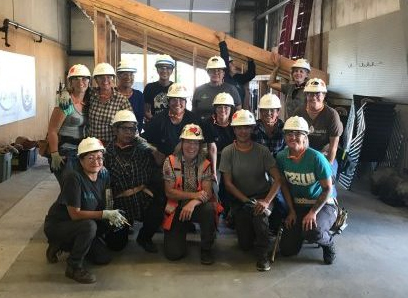
Given the significant demand for diverse, skilled, and qualified construction workers in the area to meet industry labor demands, Oregon Tradeswomen piloted our apprenticeship – readiness-training program, Trades and Apprenticeship Career Class (TACC) in Redmond, Oregon in September 2019. The pilot training was made possible by generous support from our union trades partners who provided critical support to make the class in Redmond a reality. From holding mock interviews, to providing hands-on instruction, to hosting graduation at UA Local 290 – our industry partners were involved to ensure the pilot was successful. Oregon Tradeswomen is grateful for their commitment to helping women gain access to great careers with good wages so they can support themselves and their families!
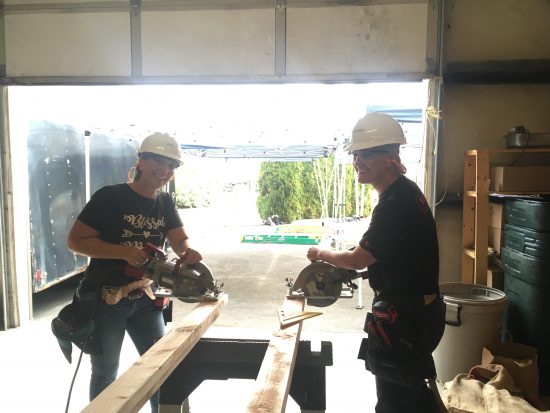
With financial support from North America’s Building Trades Unions in Washington, D.C. and local support from Robert Camarillo, Executive Secretary of the Oregon State Building and Construction Trades Council, Oregon Tradeswomen was able to work with regional industry and community partners in Central Oregon. In turn, our partners in Central Oregon were critical in helping to recruit jobseekers and connect to local employers: Heather Fitch and East Cascades Workforce Board, Wendell Jim at the Warm Springs Tribal Employment Resource Office, Rena Gibney of the Oregon Department of Human Services Self-Sufficiency Programs and Joe Mizzolo of WorkSource Redmond and our many friends at Central Oregon Community College for all of their support as well.
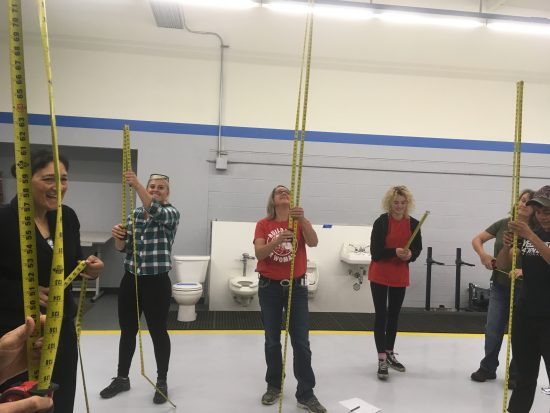
Thanks to our industry partners for lending their time, talent and support to this project:
- UA Local 290
- NECA IBEW Electrical Training Center and IBEW Local 48
- NECA IBEW Central Training Center and IBEW Local 280
- Oregon Laborers Apprenticeship & Training
- Cement Masons Apprenticeship Local 555
- Ironworkers Apprenticeship Local 29
- Roofers Apprenticeship Local 49
- Pacific Northwest Carpenters Training Institute
- IUOE Local 701 Apprenticeship
- Oregon Bricklayers and Allied Crafts
Oregon Tradeswomen also extends immense gratitude to our friend Dave Burger of UA Local 290. Dave went above and beyond to ensure this pilot training in Redmond was successful. He arrived early, stayed late, and offered tremendous support to our team as well as to jobseekers. Dave connected program participants to one another for transportation, support, helped refer women to the program, cooked food for program participants and staff, and demonstrated what an industry partner committed to diversity, equity, and inclusion looks like. Oregon Tradeswomen is eternally grateful.
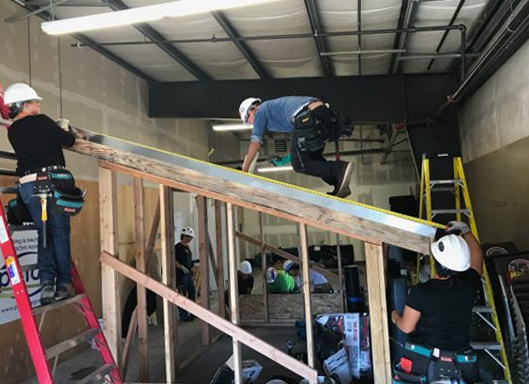
Fifteen program participants completed the apprenticeship readiness training program and received a pre-apprenticeship training certificate from the Oregon Bureau of Labor and Industries, demonstrating their competencies and achievement in being prepared for registered apprenticeship and employment in the skilled trades. Oregon Tradeswomen was honored to host Oregon’s Labor Commissioner Val Hoyle as our keynote speaker at the graduation ceremony. Commissioner Hoyle’s service to the great state of Oregon, and her commitment to equity and justice, made us proud to have her speak to the graduates and their families.
Congratulations to the TACC program graduates – we wish them all well on their journey forward!
- Wanda Berry
- Eva Brewer
- Kayla Burns
- Claudia (Paloma) Castro
- Laura (K.K) Crowe
- Audreanna (Audrey) De La Rosa
- Lianna Erwert
- Peggy Gilbert
- Susan Guerin
- Camille Hernandez
- Lara Martinez
- Damaris Monroy
- Kelli Moody
- Susan Mulkey
- Ryleigh Shiner
- Amelia Templeton
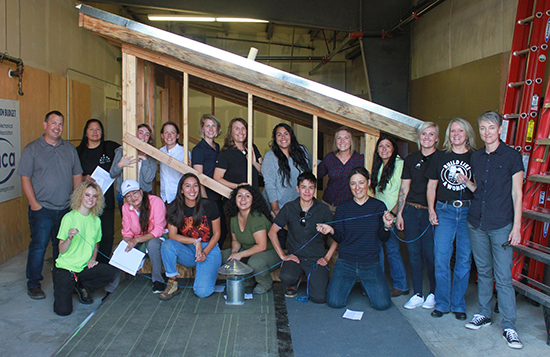
You Built With Us!

Build With Us!, Oregon Tradeswomen’s third annual Blue Collar Gala, was filled to capacity with excitement, generosity and a few happy tears! YOU turned out in force with an overwhelming outpouring of support that exceeded our goal and will help set us up to serve even more tradeswomen in our new training facility in January. The incredible spirit of community and unwavering commitment to equity, inclusion, and economic justice is humbling.
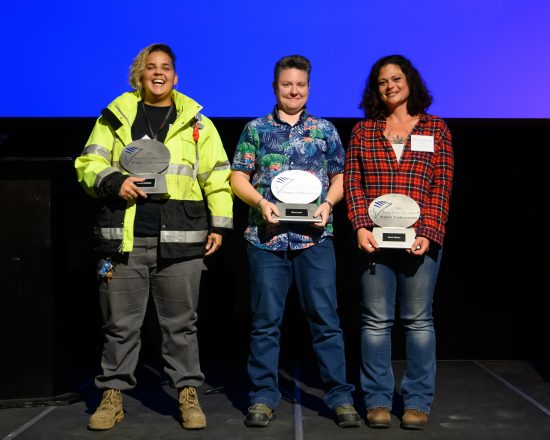
Congratulations to four incredible people, nominated by the industry and awarded for their commitment to being leaders in their trades. Valerie Curbelo, Shaz Lynch, Sara Moore, and Aisha Winters (Not Pictured) were selected for the award by Oregon Tradeswomen’s Board of Directors, not an easy feat considering the field of 27 exceptional nominees.
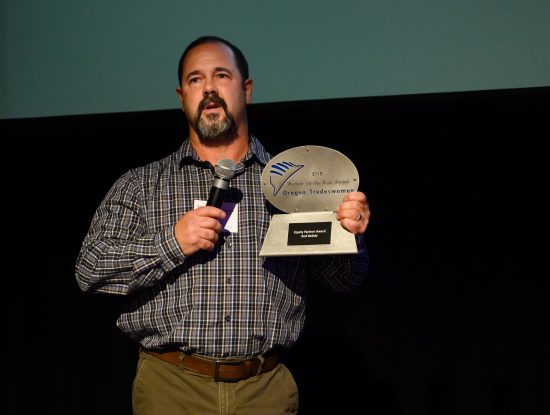
Two new honors were also awarded this year: The Equity Partner Award and the Wanda Hall Legacy Award. The Equity Partner Award was given to Rod Belisle, Training Director at the NECA-IBEW Electrical Training Center, to honor his commitment to increasing diversity in the electrical trade, and for being an incredible partner to Oregon Tradeswomen.
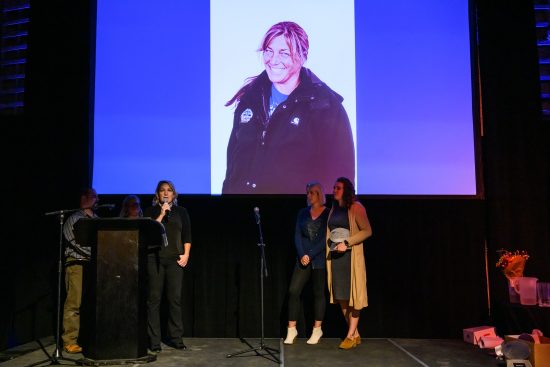
The other new award in 2019 was a posthumous award presented to the daughters of Wanda Hall of the Portland Water Bureau. Wanda’s enthusiasm and dedication to uplifting women in the trades through support and mentorship will be missed. Starting in 2020, Oregon Tradeswomen will solicit nominations for the Wanda Hall Legacy Award to honor other women in the trades whose commitment to informing and mentoring the next generation stands out. Oregon Tradeswomen salutes all the winners and nominees for their perseverance, passion, and grit, and thank them for their many contributions to our community, industry, and movement.
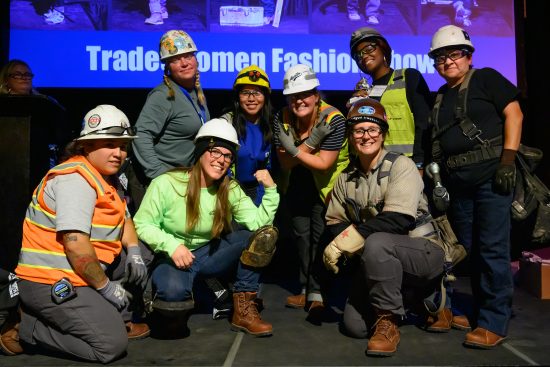
The staff and board of Oregon Tradeswomen thank you from the bottom of our hearts for your generosity – helping us build the future home of Oregon Tradeswomen and increasing our capacity to help more women change their lives. Thank you for helping us pave a pathway to prosperity for the women who want to work in construction and a brighter future for our region’s construction workforce and industry.
We hope you had a wonderful time and we look forward to seeing you next year!
Oregon Tradeswomen Supporters Bring on Industry Challenge!

“We admire the ability of Oregon Tradeswomen to do outreach and offer training that helps people be work ready in such a short time. We want to make sure everyone who needs more workers knows about this incredible resource and help them train even more construction workers!”
~ HoneyPot Fund donors
Oregon Tradeswomen is truly lucky to have such tremendous support across our industry and community to live our mission and work in supporting women into skilled trades careers and economic self-sufficiency.
Two such donors, who wish to remain anonymous, created the “HoneyPot Fund” to support our Pathways to Success program and general operation support for our expansion to Rockwood. These incredible donors are challenging others to step up to fund our apprenticeship readiness program and help ensure more women have good careers with good wages and benefits to support themselves and their families.
What’s the Challenge?
The HoneyPot Fund is offering $10,000 to match any $10,000 donation to Oregon Tradeswomen!
When is the Challenge?
You can donate online today, join us at Build with Us! and raise your paddle for $10,000 or go old school and send us a check to:
Oregon Tradeswomen
ATTN: HoneyPot Fund
454 SE 187th Avenue
Portland OR 97233
How Can I Support the Challenge?
Are you ready to put your wallet behind your conviction to a diverse, skilled, and equitable workforce? We knew you’d say YES! Donate today and challenge others in our industry and community!
How will my donation help?
Your generous contribution will be matched by the HoneyPot Fund to help support Oregon Tradeswomen’s continued growth, our move to Rockwood, and allow us to support more women securing their economic future through and help meet industry demand for a skilled and diverse workforce!
Thank you for your support and stepping up to the HoneyPot Industry Challenge!
With gratitude & love,
Oregon Tradeswomen
Preserving the Registered Apprenticeship Model
Since the introduction of the Industry Recognized Apprenticeship Program (IRAP) concept, there has been concern in the field about creating another form of apprenticeship including oversight, alignment, equity components, and guidance on how employers implement anti-harassment and discrimination requirements as well as other issues such as portability, and industry standards. The DOL’s proposed rule would formally include IRAPs in the Code of Federal Regulations (29 CFR Part 29) that govern the RA system under the National Apprenticeship Act of 1937.
Additionally, the rule aims to establish a process to authorize third-party “Standards Recognition Entities (SREs)” that would recognize IRAPs. The proposed rule describes what entities may become SREs; what their responsibilities and requirements would be; hallmarks of the high-quality apprenticeship programs they would recognize; and how the administrator of the Office of Apprenticeship would interact with them. The rule also describes how IRAPs would operate in parallel with the RA system.
This proposed rule change is an important moment that will affect the future of apprenticeship and access, opportunity and equity in apprenticeship – please take time to respond to public comment in sharing your knowledge and expertise during this comment period.
Download the Talking Points document
The deadline to submit comments is August 26, 2019! Please make your voice heard!
Changing the Skyline, Changing Lives

Oregon Tradeswomen is proud of our contributions to the Multnomah County Courthouse building – a project reflecting our shared values of diversity within its workforce, clients, contractors, and the community as a shared prosperity model. In alignment with Multnomah County’s commitment to advancing cultural diversity and social equity in the workforce, Oregon Tradeswomen is working to support these same goals.
The County and the general contractor for the project, Hoffman Construction, set specific diversity and equity goals and built a diverse team of subcontractors. The team is tracking progress toward these goals on monthly basis to ensure the principals of diversity, equity, and inclusion are making an impact in real time on the job and for our region’s workforce and minority contractor community.
In addition to working with Oregon Tradeswomen, Multnomah County and Hoffman Construction are working with subcontractors and other Bureau of Labor and Industries (BOLI) certified pre-apprenticeship training programs on recruitment, training, and retention of women and minority workers across trades, and continuing to foster a welcoming and safe workplace environment where workers and emerging firms have opportunities to grow and succeed. View the latest diversity dashboard for all the reporting metrics.

Thanks to an investment by Oregon’s Bureau of Labor and Industry, Oregon Tradeswomen was able to introduce a bystander intervention model to reduce hazing, harassment, and bullying, which disproportionately affect women and minorities on the job-site. The County and Hoffman Construction committed to implementing and testing this pilot model to evaluate the impact on worker satisfaction, safety, retention, and workplace equity. To date, the project has seen some successes in building a respectful workplace model, hearing from tradesworkers on the jobsite who have expressed the difference on working on a construction site that has a commitment to ending harassment and discrimination.
Because of these intentional policies, tradesworkers like Oregon Tradeswomen graduate, carpenter, and mother of triplets, Heather Mayther, now have access to careers that provide financial stability for their families as well as the pride that comes with building up their communities. Recently, Multnomah County produced a short video telling the stories of Heather and fellow tradesperson, Shawn Story, and how their involvement in this project has transformed their lives. Stories like Shawn and Heather’s are valuable as they help people outside of the construction industry understand that these jobs can lift people out of poverty and into the middle class. Multnomah County Chair Deborah Kafoury showed this video as part of her State of the County address and declared, “I am proud that these public projects are changing the Portland skyline, but I am most proud that they are changing lives.”
Tradeswoman and Mother Trillium Ward

No one said it was easy being a tradeswoman and a mom, but being a tradeswoman can give you the financial security to provide for your family. Trillium Ward began her journey into the skilled trades as a single mother of two, working as a drug and alcohol counselor for kids and young adults. Her job as a counselor was challenging work that only paid $12.50 an hour, hardly enough to support a family of three. Public assistance was helpful, but this was not the life Trillium imagined for herself. She had always loved working with her hands and took wood-shop, metal-shop, and other vocational programs her high school offered which focused on hands-on learning. With these experiences, the skilled trades started to look quite appealing as a new career option.
Trillium first applied to become an electrical apprentice with the IBEW, but didn’t score high enough on the application process to enter the program. After hearing about Oregon Tradeswomen around the community, she decided to enroll in the pre-apprenticeship program, the Trades and Apprenticeship Career Class (TACC). She knew that going through this program would be like receiving an endorsement of her qualifications and ability to succeed in the field. She was accepted to a special session of TACC that ran at night, which allowed her to continue working full time to support her family. If that wasn’t enough to demonstrate her commitment, she was also simultaneously taking a welding class on weekends!
After all her hard work in Oregon Tradeswomen’s pre-apprenticeship program, Trillium graduated from TACC, re-applied to the IBEW’s apprenticeship program, and was accepted! As an apprentice, she immediately made $3 more per hour than she did as a drug and alcohol counselor. Being a single mother at the time, it was imperative to have a support network of family and other moms to help out with childcare because a typical day for Trillium started at 4:00 am! Thankfully, just 6 months into her apprenticeship, Trillium made enough money to get off of state assistance and afford daycare. Her advice to mothers thinking about pursuing a career in the trades is to “make sure you have reliable daycare that can accommodate early mornings and the ability to be flexible with your schedule!”
Just 5 years after starting on this new path, Trillium journeyed out of the Electrical apprenticeship! This is an incredibly proud accomplishment for her, because she managed to meet all of the strict program requirements around attendance and grades, all while having a new baby with her partner. Trillium is currently working for Oregon Electric Group where she runs bus ducts, installs conduits, pulls wire, creates panels, and installs lights among – other things. Trillium loves how her work keeps her brain engaged – whether she is learning new technology, new skills, or being put in different situations requiring adaptation and problem-solving. The hardest part about her job is the lack of continuity. When the people you work with, your start time, and your commute change regularly, its hard to plan for the future.
The biggest barrier Trillium faces as a woman in the trades is not outright harassment, but that compared to the men on her crews, she is not taken seriously. As a result, she has to to above and beyond to prove herself on every job-site – otherwise the men frequently assume that she isn’t competent. This becomes exhausting when you’re changing job-sites regularly – having to prove your worth with a new crew each time. Trillium’s advice for other tradeswomen is to help support other women. Solidarity is important in this field, so when you see other women, reach out, because the isolation can be hard.
In the end, the hard work pays off. Trillium says, “The amount of change in my financial status, going from poverty and living paycheck to paycheck, to financial freedom where I can buy a home and go on vacation has made a world of difference in my life and my children’s lives.”
A Pathway to Green Careers

The Environmental Protection Agency (EPA) is invested in creating work opportunities in remediation and abatement in their own communities. Remediation and abatement are the methods used when a substance or practice in the construction industry is harmful to the environment and community. Remediation is the concept of using special techniques to make sure workers stay safe when dealing with hazardous materials such as lead and asbestos. Abatement is the process of removing the environmental threat so the entire community stays safe.
Often times, the remediation work needing to be done in a community is conducted by out of state workers. Oregon Tradeswomen’s Training Director, Amy James Neel, emphasizes, “Bringing in workers from out of state is a problem because these are high-skill, high-paying jobs. When people come in from out of state to do the work, those workers take their skills and their money with them out of the community and out of the state when the job is done.” In response, the EPA developed the Brownfields Program in 1995 to provide funding for training marginalized communities to enable them to access these important, high-paying jobs.
Oregon Tradeswomen has received Brownfields Program funding for many years, introducing our pre-apprenticeship students to career opportunities in our community dealing with remediation, alternative energy, material reuse, and cleaning up the federally recognized pollution sites affecting the Columbia and Willamette rivers.
Oregon Tradeswomen’s Environmental Worker Training Track is a two-week optional training providing our students necessary skills and certifications to pursue competitive careers in the industry. Oregon Tradeswomen’s pre-apprenticeship students are shown a broad spectrum of possible careers in environmental remediation, anything from spill response, biohazard cleanup, wind-turbine maintenance, asbestos removal, and weatherization, just to name a few. One of the most advantageous aspects of the Brownfields EPA Grant funding is that it allows Oregon Tradeswomen to assist students beyond the two week training track! We are able to support students who are truly dedicated to pursuing careers the EPA deems beneficial to the environment by helping interested students obtain certifications giving them a competitive edge in their job search. For example, if a student is interested in deconstruction, we can help them get an RRP Certification which shows that they know how to safely work around lead.
Oregon Tradeswomen’s program has adapted over the years we have implemented this training, as our curriculum is based specifically on community needs and the jobs opportunities connected to those needs. At the present time, the demand for green/energy efficient practices and solar PV installations in residential buildings are growing quickly. In response, Oregon Tradeswomen has partnered with Energy Trust of Oregon to integrate an “Introduction to Green Construction and Solar PV” segment for the two-week training track delivered by Earth Advantage. During this in-depth training, our students learn about the following high performance building best practices and career opportunities in the green building and renewable energy industries:
- Energy Efficiency
- Health & Indoor Air Quality
- Sustainable Materials
- Water Conservation
- Land Management
- Solar Photovoltaics (PV)
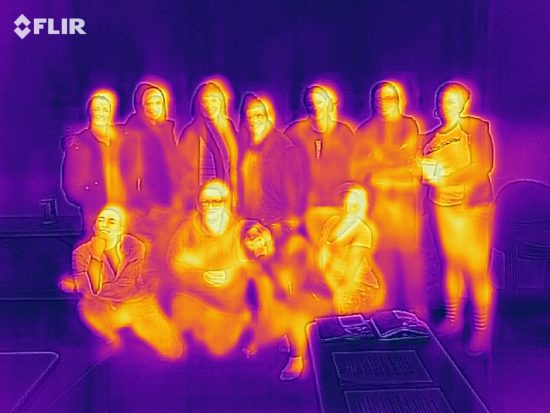
As an added incentive, Energy Trust provides scholarships to participate in a 6-month Sustainable Homes Professionals (SHP) accreditation training offered by Earth Advantage that takes place every fall in Portland. Funding for scholarships was provided by Energy Trust to support student scholarships for Oregon Tradeswomen, as part of its overall efforts to expand training for energy efficiency and renewable energy in the building industry. Discounts for Minority and Women Business Enterprise (M/WSB) certified firms for this accreditation training are also available and provided by Earth Advantage.
Oregon Tradeswomen graduate Chelsea Acker recently received the SHP scholarship and excelled in the course, which led her to join the team at Green Hammer, a design-build firm delivering eco-friendly homes, renovations, and communities. In a note to Earth Advantage, Chelsea said:
“I am writing to extend many thanks and extreme gratitude to Earth Advantage. I am one of the SHP Scholarship awardees from the current SHP class. I graduated from Oregon Tradeswomen this past summer and knew I wanted to start my career in carpentry working for a company that focused on high performance energy efficient and sustainable builds. The SHP class was recommended to me as a way to learn more about building science and meet others who are active in this field. Within a few months into the course, I found myself passionate about building science, and applying for jobs. I was hired full-time at Green Hammer just a few weeks ago and it is my dream job! I can’t believe I am getting to begin my career with such an amazing company that aligns so clearly with my ethics, values, and passion. I honestly DO NOT believe that I would have gotten the job if it weren’t for this SHP course, and there is no way as a woman entering the field with little to no experience that I would have been able to afford this course on my own. I am extremely grateful and humbled by this opportunity and wanted to extend many many thanks for believing in me and giving me this chance. This course made is possible for me to enter into the trades with a focus on high performance energy efficient homes/buildings.”
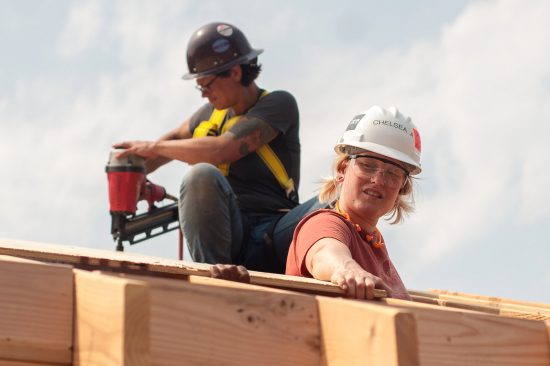
Oregon Tradeswomen is tremendously grateful for the opportunity to work with community partners in the green construction industry under the EPA’s grant. With this support, Oregon Tradeswomen is able to help our pre-apprenticeship graduates gain valuable skills to pursue a living wage career all while helping our local community. This funding also allows Oregon Tradeswomen to support our industry partners with exceptional, and appropriately certified employees who will go on to make the Earth a safer and more inhabitable place.
LinkedIn Learning Teaches Construction Fundamentals
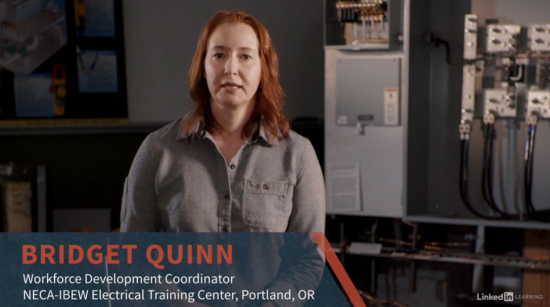
In 2018, Mary Ann Naylor, Oregon Tradeswomen’s Communications and Marketing Director, was approached directly by Linda Sellheim of LinkedIn Learning, also known as Lynda.com, a massive online learning resource for professional development. Linda was interested in creating a video series for LinkedIn Learning exploring careers in the construction trades, what working those jobs entails, and dispelling myths about the trades along the way. Most importantly, she was looking for a tradeswoman to be the face and voice leading the series!
After a productive meeting with Oregon Tradeswomen’s Development and Communications team, we directed Linda to the NECA-IBEW Electrical Training Center (NIETC) and our friend Bridget Quinn, who works as their Workforce Development Coordinator. We knew Bridget would be a prime candidate to lead a series on construction fundamentals. Not only is Bridget a Journey-level tradeswoman, but her role at the NIETC revolves around working with prospective apprentice-applicants to provide them with resources and guidance needed to successfully access union apprenticeship. Bridget is also a huge ally for Oregon Tradeswomen when we hold our Annual Career Fair at the Electrical Training Center and is a recipient of the Daily Journal of Commerce’s Women of Vision Award in 2017!
We are pleased to share links to the LinkedIn Learning track featuring Bridget Quinn. Videos are live on LinkedIn Learning and we encourage you to preview this incredible resource we hope will help many understand and access the world of the construction trades!
Helen Getchell Women of Color in the Trades Fund
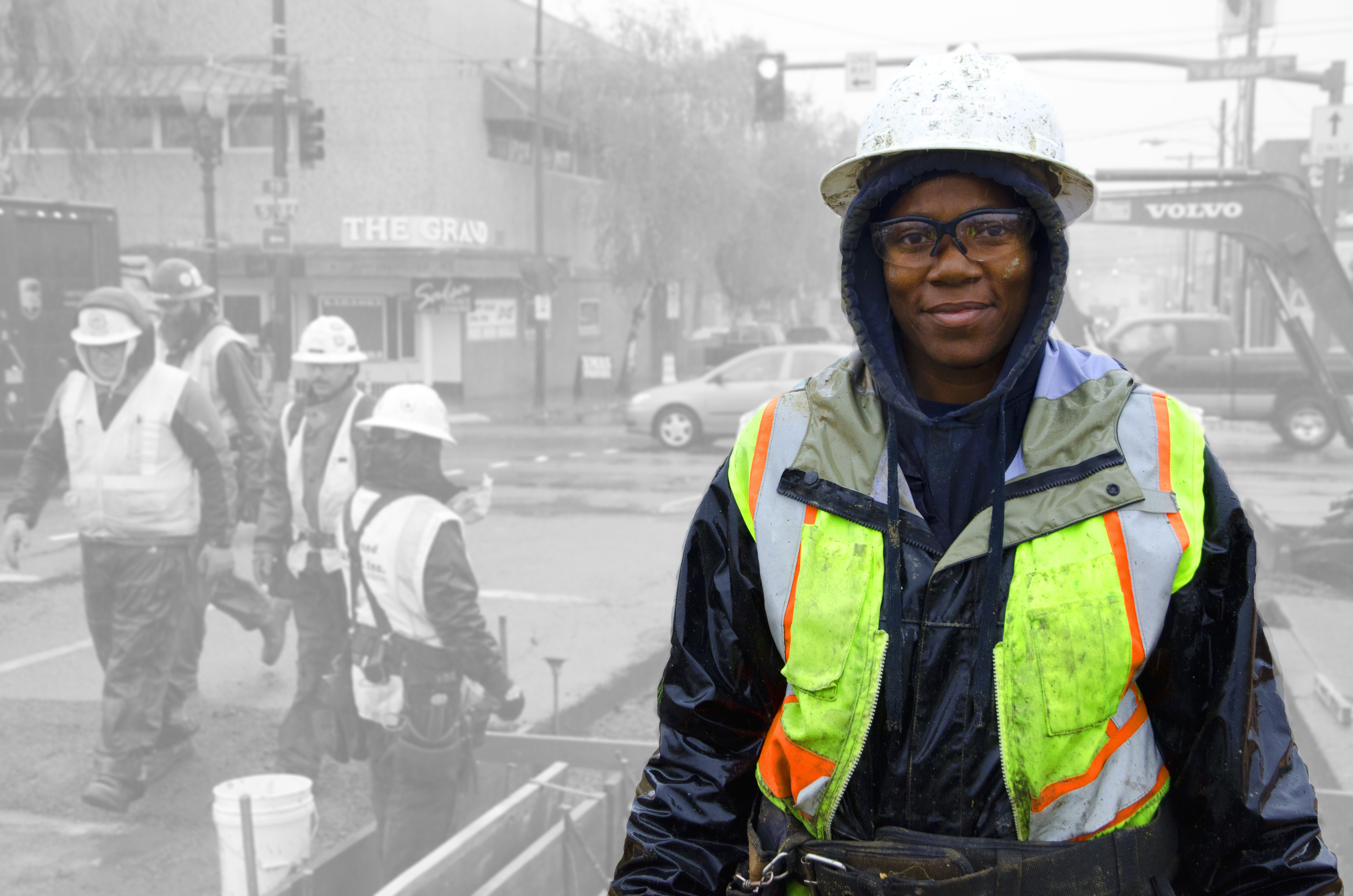
Oregon Tradeswomen is committed to increasing the participation of women in the skilled trades, and we have shifted our outreach to focus on women of color who remain significantly under-represented in the construction industry, here in Oregon and across the nation.
We know women of color leave the construction industry at higher rates than both white women and their male counterparts, and Oregon Tradeswomen is working to address barriers and increase retention. There are many factors contributing to these high attrition rates, and Oregon Tradeswomen is working to help address those issues.
- We are focusing on strong public policy to ensure participation goals are in place on public project for a diverse workforce.
- We are working to create access to quality, affordable childcare.
- We are committed to addressing harassment and discrimination in the workplace.
These are just some of the ways we seek to shift the numbers, support our industry, and improve outcomes for workers in our communities. The Helen Getchell Fund was established to specifically provide support to help increase the retention of success of our sisters of color in the construction industry.
More about The Helen Getchell Women of Color in the Trades Fund
The Helen Getchell Women of Color in the Trades Fund is a designated fund housed and managed at Oregon Tradeswomen. Through the fund, women of color who demonstrate need are provided with direct financial support to successfully complete pre-apprenticeship and enter into employment and registered apprenticeship in the skilled trades.
The fund is advised by members of the Helen Getchell Giving Circle, which is comprised of the fund’s founder, Charlene Getchell, and invited community and industry stakeholders who are committed to ensuring access, opportunity and equity for women of color in the skilled trades.
Or mail your gift to:
Oregon Tradeswomen
454 SE 187th Avenue
Portland, OR 97233
Wire A Light Dates Announced for 2019
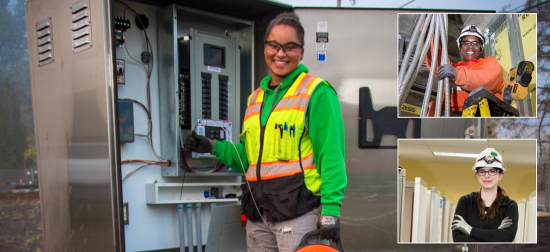
Would you like to learn about the possibilities a career as an electrician offers? The NECA-IBEW Electrical Training Center is hosting four “Wire a Light” workshops for women who have an interest in the electrical trades. During this free workshop, you can learn how to wire a light, meet women electricians in the industry, and find out how to start your career as an electrician.
Dates & Registration:
September 19, 2019
6:00 pm – 8:00 pm
Register for the 9/19 workshop
December 5, 2019
6:00 pm – 8:00 pm
Register for the 12/5 workshop
Location:
NECA-IBEW Electrical Training Center
16021 NE Airport Way
Bus Lines:
NECA-IBEW Electrical Training Center is accessible via TriMet bus lines 74 and 87.